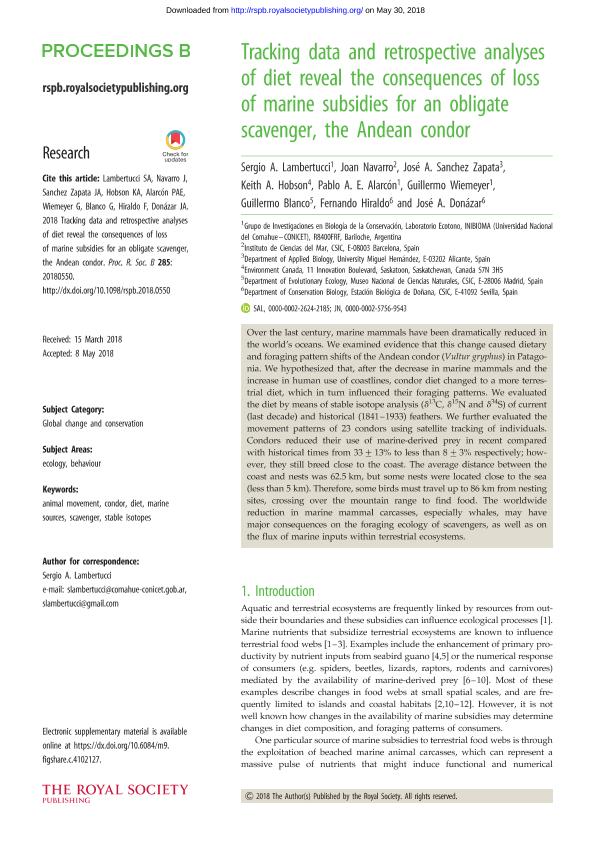Artículo
Tracking data and retrospective analyses of diet reveal the consequences of loss of marine subsidies for an obligate scavenger, the andean condor
Lambertucci, Sergio Agustin ; Navarro, Joan; Sanchez Zapata, José A.; Hobson, Keith A.; Alarcón, Pablo Angel Eduardo
; Navarro, Joan; Sanchez Zapata, José A.; Hobson, Keith A.; Alarcón, Pablo Angel Eduardo ; Wiemeyer, Guillermo; Blanco, Guillermo; Hiraldo, Fernando; Donázar, José A.
; Wiemeyer, Guillermo; Blanco, Guillermo; Hiraldo, Fernando; Donázar, José A.
 ; Navarro, Joan; Sanchez Zapata, José A.; Hobson, Keith A.; Alarcón, Pablo Angel Eduardo
; Navarro, Joan; Sanchez Zapata, José A.; Hobson, Keith A.; Alarcón, Pablo Angel Eduardo ; Wiemeyer, Guillermo; Blanco, Guillermo; Hiraldo, Fernando; Donázar, José A.
; Wiemeyer, Guillermo; Blanco, Guillermo; Hiraldo, Fernando; Donázar, José A.
Fecha de publicación:
30/05/2018
Editorial:
The Royal Society
Revista:
Proceedings of the Royal Society of London. Series B: Biological Sciences
ISSN:
0962-8452
e-ISSN:
1471-2954
Idioma:
Inglés
Tipo de recurso:
Artículo publicado
Clasificación temática:
Resumen
Over the last century, marine mammals have been dramatically reduced in the world’s oceans. We examined evidence that this change caused dietary and foraging pattern shifts of the Andean condor (Vultur gryphus) in Patagonia. We hypothesized that, after the decrease in marine mammals and the increase in human use of coastlines, condor diet changed to a more terrestrial diet, which in turn influenced their foraging patterns. We evaluated the diet by means of stable isotope analysis (δ13C, δ15N and δ34S) of current (last decade) and historical (1841–1933) feathers. We further evaluated the movement patterns of 23 condors using satellite tracking of individuals. Condors reduced their use of marine-derived prey in recent compared with historical times from 33+13% to less than 8+3% respectively; however, they still breed close to the coast. The average distance between the coast and nests was 62.5 km, but some nests were located close to the sea (less than 5 km). Therefore, some birds must travel up to 86 km from nesting sites, crossing over the mountain range to find food. The worldwide reduction in marine mammal carcasses, especially whales, may have major consequences on the foraging ecology of scavengers, as well as on the flux of marine inputs within terrestrial ecosystems.
Palabras clave:
ANIMAL MOVEMENT
,
CONDOR
,
DIET
,
MARINE SOURCES
,
SCAVENGER
,
STABLE ISOTOPES
Archivos asociados
Licencia
Identificadores
Colecciones
Articulos(INIBIOMA)
Articulos de INST. DE INVEST.EN BIODIVERSIDAD Y MEDIOAMBIENTE
Articulos de INST. DE INVEST.EN BIODIVERSIDAD Y MEDIOAMBIENTE
Citación
Lambertucci, Sergio Agustin; Navarro, Joan; Sanchez Zapata, José A.; Hobson, Keith A.; Alarcón, Pablo Angel Eduardo; et al.; Tracking data and retrospective analyses of diet reveal the consequences of loss of marine subsidies for an obligate scavenger, the andean condor; The Royal Society; Proceedings of the Royal Society of London. Series B: Biological Sciences; 285; 1879; 30-5-2018; 1-7
Compartir
Altmétricas



